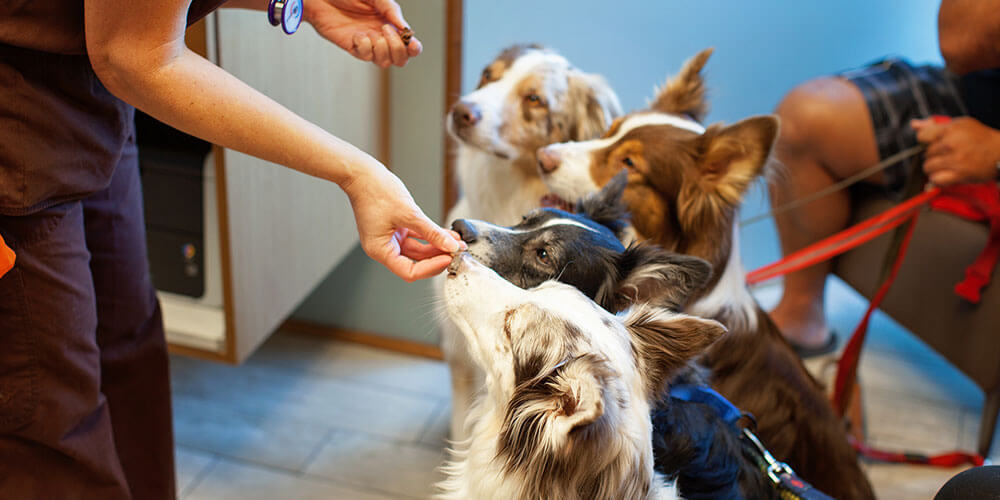While most dog owners know that feeding their pets scraps from their plate is not the best choice, many people still feed their dogs “people food” as a treat. Even though most human foods are not necessarily harmful to dogs, there are some seemingly innocent foods that are actually poisonous or can cause immediate injury.
Here is what you need to know about people foods that you should never feed your dog.
Artificial Sweeteners
Many sugar-free foods, including baked goods, gum, and candy, have xylitol. Xylitol is a sugar alcohol that has fewer calories than regular sugar. It’s commonly added in large quantities to diet foods and dentist-friendly candy. Xylitol is mostly harmless in small amounts for humans, but is horribly toxic to dogs.
Xylitol is poisonous for dogs because, unlike in humans, it is still processed as a sugar in the canine digestive system. Almost as soon as your dog eats it, the xylitol is absorbed into the bloodstream, stimulating the release of insulin from the pancreas.
However, the response is exaggerated, dropping the blood sugar so low it can cause seizures, liver damage, and death. Very small amounts of gum or xylitol-sweetened cake can be enough to seriously injure your dog.
Onions and Garlic
You might want to share your leftover lasagna with your dog, but if it’s full of garlic and onions—even if they’re cooked—think again. Onions and garlic are poisonous for dogs. Even a small portion can cause stomach upset, and large amounts can actually damage your dog’s red blood cells, making them rupture.
Ruptured red blood cells lead to life threatening anemia, and in severe cases, loss of oxygen delivery to the major organs. Keep all onions and garlic out of the meat you might cook for your dog, and never allow anyone to feed your dog food like garlic bread or pizza. Garlic is more potent than onions, so it only take a small amount to cause damage.
Grapes and Raisins
Some dogs love the sweetness of fresh fruit. Your dog might readily do tricks for a slice of orange or a nibble of apple, but grapes and raisins are not good treats for your dog.
Scientists are still unsure of the exact reasons why raisins and grapes are so bad, but because so many dogs of different sizes and breeds have suffered because of grape and raisin poisoning, vets now advise avoiding them altogether.
This fruit, whether fresh or dried, can lead to sudden and acute kidney failure. If you suspect your dog has eaten even a small amount, call your vet immediately.
Chocolate
Chocolate is a natural source of caffeine, which can be harmful for your dog, but it is also the main source of theobromine poisoning in dogs. All chocolate should be off limits: cocoa, baked goods, bars, and flavorings.
Why is chocolate fine for humans and terrible for dogs? Theobromine is easily metabolized by humans, so regular chocolate consumption is not harmful. Dogs, however, do not process theobromine very well, making it easy for their system to become overwhelmed and for toxic levels to build up quickly.
The problem is even more pronounced with dark chocolate or pure cocoa or unsweetened baking chocolate. Small dogs are a greater risk of poisoning because it only takes a small amount to become toxic.
Because theobromine can stay in the dog’s system for a long time, early detection of chocolate poisoning is key. The first signs are usually gastrointestinal distress. If treated quickly, your vet can help purge the chocolate through induced vomiting and help alleviate symptoms with IV fluids. ** Please do not attempt this at home**
Left untreated, chocolate consumption can damage the nervous system, causing seizures, internal bleeding, and heart arrhythmias. In severe cases even coma and death may occur.
There’s another reason to avoid chocolate in our four legged friends. The fat and sugar content in milk and dark chocolate bars can also trigger pancreatitis in dogs.
Nuts
Dogs love nuts. They are tasty, fatty, and packed with protein. Your dog’s favorite treats might be made with peanut butter. But there are some nuts that are not good for dogs, including:
Macadamia nuts: Macadamia nuts cause muscle weakness, tremors, and even hyperthermia.
Almonds and pecans: These are not poisonous like some other nuts, but they still cause stomach upset.
Pistachios: Too many pistachios can cause pancreatitis.
Walnuts: Walnuts are among the most dangerous, as they can lead to nerve damage and seizures.
If you want to feed your dog nuts, stick with limited amounts of roasted cashews, peanuts, and hazelnuts. Nuts in general are high in calories, so they should only be used as an occasional special treat.
For more information on what you can and cannot feed your dog, contact the animal specialists at 1st Pet Veterinary Centers. To stay on the safe side, leave people food on the plate and feed your dog vet-approved food and dog treats.

